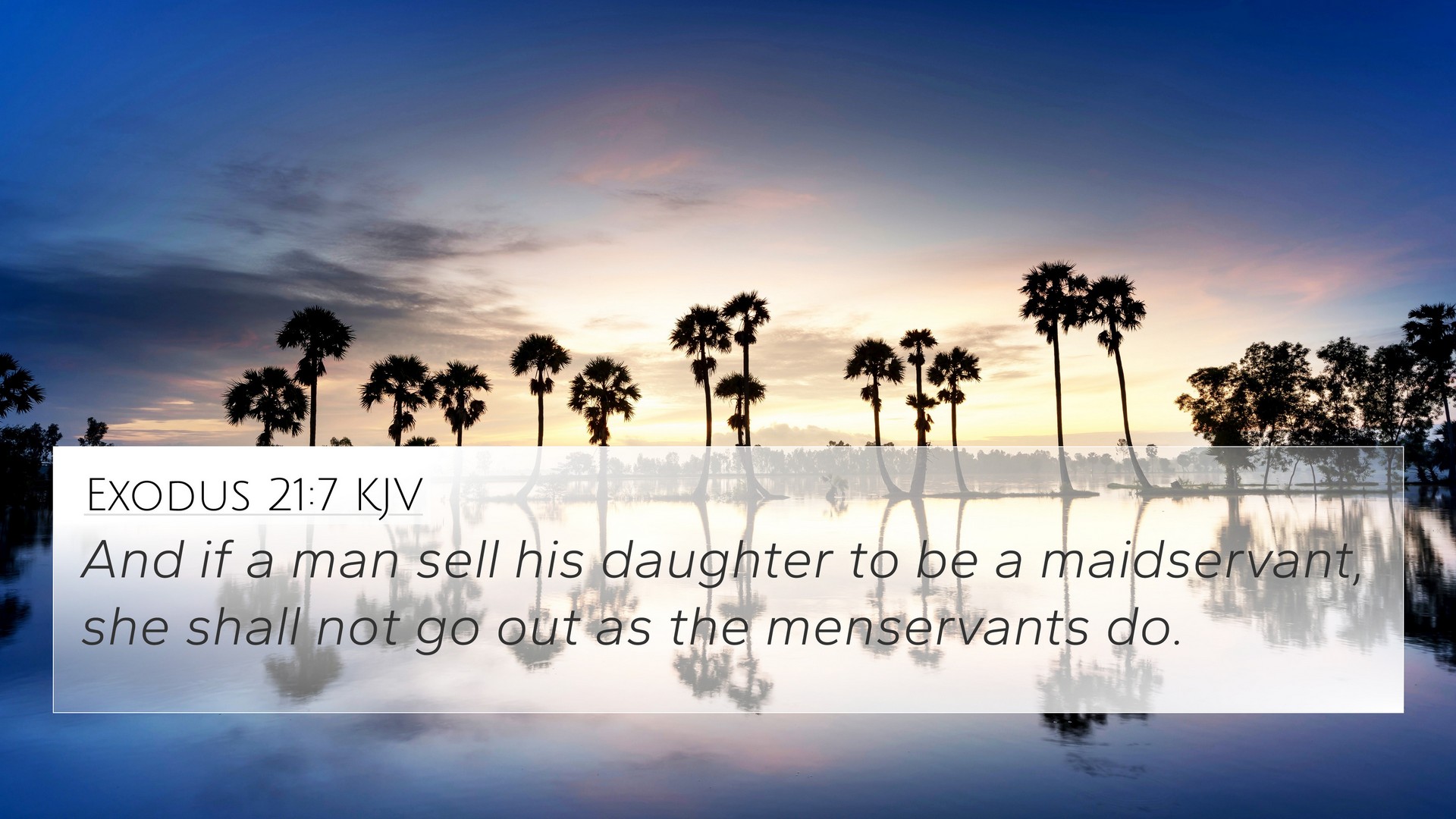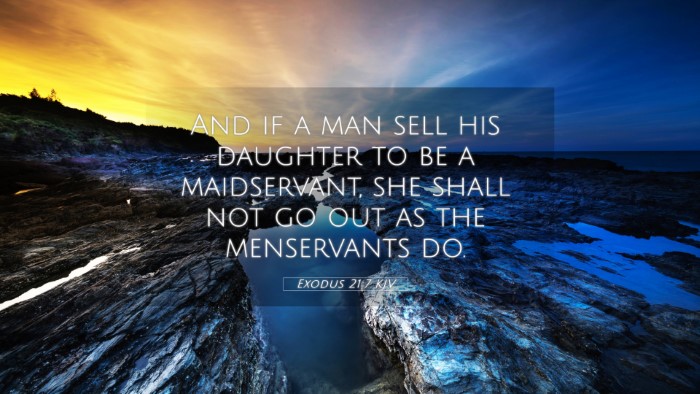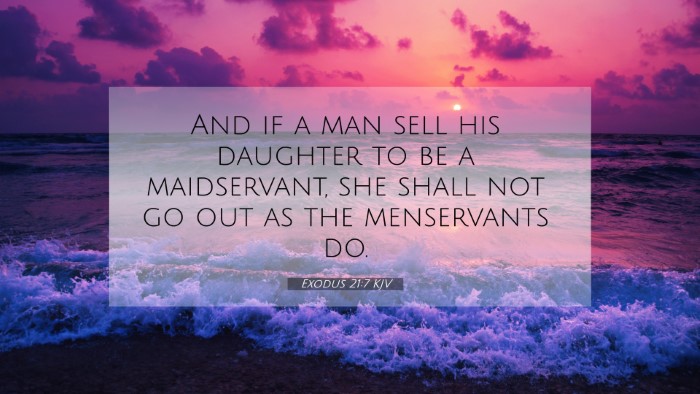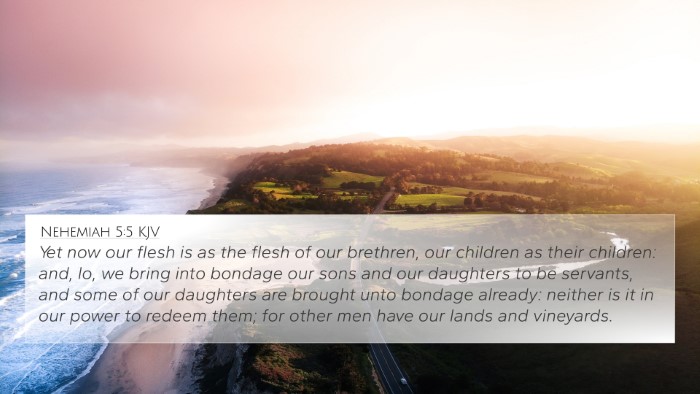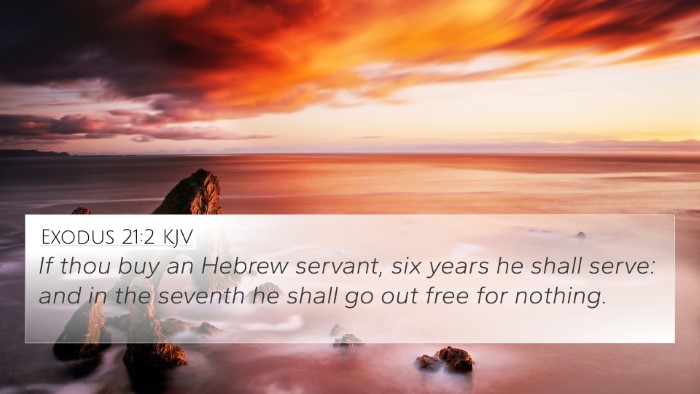Exodus 21:7 - Meaning and Interpretation
Verse: "And if a man sell his daughter to be a maidservant, she shall not go out as the menservants do."
Overview
The verse addresses the law concerning the sale of a daughter into servitude, highlighting the differences in treatment between male and female servants. Understanding this verse requires an examination of its context within the Mosaic Law and the cultural practices of the time.
Commentary Insights
Matthew Henry's Commentary
Matthew Henry emphasizes that this regulation was designed to protect women from being treated unfairly within the servitude system. He notes that while it was not uncommon in ancient times for a father to sell his daughter as a servant, the law provided rights and protections specifically for her welfare.
Albert Barnes' Notes
Albert Barnes points out that the text reflects the cultural norms of ancient Israel, where daughters could be given in servitude often to secure a family’s economic stability. However, Barnes highlights that girls sold into servitude had protections, and their treatment was markedly different from that of male slaves.
Adam Clarke's Commentary
Adam Clarke elaborates on the implications of this law, implying that while servitude was permitted, there were moral obligations to ensure the dignity and rights of the female servants were respected. He notes that the emphasis on not treating them the same as male servants indicates a differentiation of roles and responsibilities.
Thematic Connections
Exodus 21:7 serves as a springboard to discuss themes of justice, protection, and the value of individuals in society. The differences in treatment based on gender prompt readers to explore broader societal issues regarding justice and equality.
Bible Verse Cross-References
- Exodus 21:16: Addresses the kidnapping and selling of individuals, setting a standard for the treatment of enslaved people.
- Leviticus 25:39-40: Discusses the rights and treatment of individuals sold into slavery, focusing on the more humane treatment for kin.
- Deuteronomy 15:12-15: Provides guidance on the release and treatment of servants after a set period, reiterating the importance of justice and kindness.
- 1 Timothy 6:1-2: Discusses the responsibilities of servants and their masters, connecting Old Testament laws with New Testament teachings regarding servitude.
- Proverbs 31:10-31: Highlights the value and virtues of women, establishing a contrast with the treatment described in servitude laws.
- Matthew 20:25-28: Jesus speaks about the nature of servanthood and leadership, providing a New Testament lens on Old Testament principles of servitude.
- Galatians 3:28: Portrays the spiritual equality of all believers, irrespective of gender, which indirectly speaks to the ethos opposed to servitude based on gender.
Practical Insights and Applications
This verse and its accompanying commentaries provide insight into ancient customs while challenging modern readers to consider how societal norms can sometimes undermine individual rights. The foundational principle here is justice and humane treatment, which is echoed throughout biblical texts.
Cross-Referencing and Study Tools
To deepen understanding and facilitate a thorough interpretation of Exodus 21:7, engage with the following tools and methods:
- Utilizing a Bible concordance to find related passages that discuss servitude, justice, and the treatment of individuals.
- Employing a cross-reference Bible study to explore connections between this verse and themes in both the Old and New Testaments.
- Considering cross-reference themes within the Pentateuch to understand the development of laws regarding human dignity.
- Engaging in comparative studies of the laws in Exodus with the ethical teachings of Jesus to see the continuity of biblical principles.
Conclusion
Exodus 21:7 offers vital insights into the Biblical law regarding servitude, particularly highlighting the nuances of gender roles. By exploring connections between Bible verses, examining thematic linkages, and utilizing tools for cross-referencing, readers can gain a richer understanding of how this verse interacts with broader biblical messages regarding justice, dignity, and the value of every individual.
